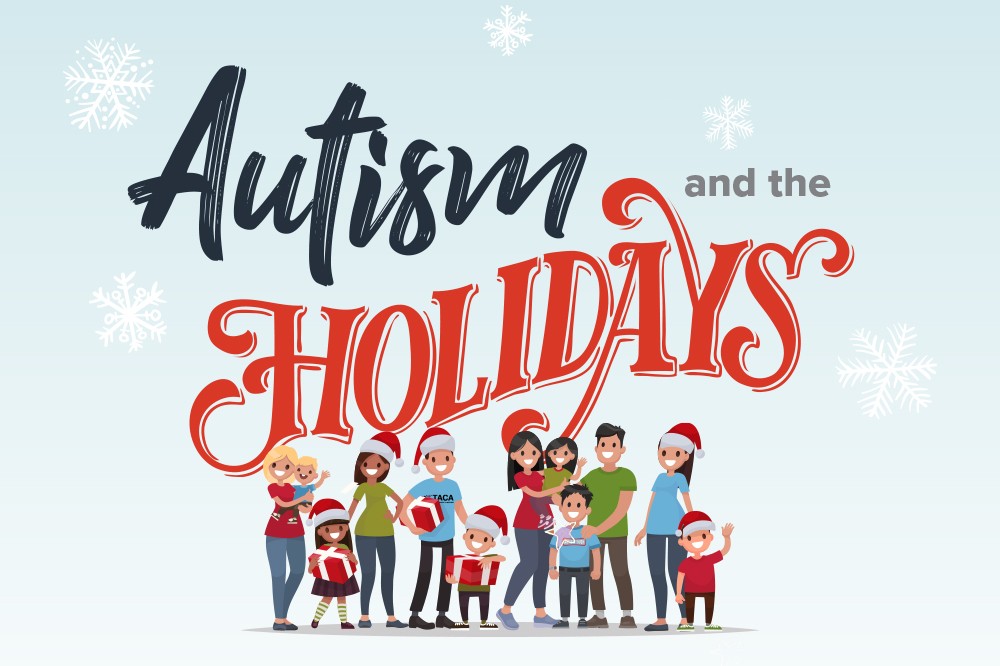Autism and the Holidays

All contents of this resource were created for informational purposes only and are not intended to be a substitute for professional advice, diagnosis, or treatment. Always seek the advice of your physician, therapist, or other qualified health providers with any questions or concerns you may have.
Celebrations and holidays gatherings can be very difficult for families with autism. Below are some tried-and-true tips that will help you overcome challenges, lessen the holiday stress, and make it a more enjoyable, happy season for all.
Safety
First and foremost, let’s talk about safety. While wandering can happen at any time, incidents tend to increase around the holidays. Be vigilant.
- Designate one responsible adult to keep eyes on your child. Give that adult a time frame. When their time frame is up, they can pass the responsibility to another responsible adult. Sharing this important responsibility assures your child always has eyes on them and gives everyone some time to relax.
- Learn more about Keeping Your Kids with ASD Safe here.
Holiday Traditions
- Traditions are meant to be created. Don’t get so caught up with keeping old traditions that you forget to make new ones which include everyone.
- Keep in mind that just because your child may not be ready to participate in a particular tradition this year doesn’t mean they won’t be able to participate in it sometime in the future. Never say never!
- Choose a tradition that’s important to you or one that you know you can pull off with great success, and put all of your efforts into making it happen.
- For example, taking a family photo, participating in a gift exchange, attending a worship service, visiting Santa.
Family Photos
- Have the photographer or their helper try to make your child laugh so the smile will be natural.
- Some kids do better with selfies. Consider doing a bunch of family selfies and then create a photo collage with them.
- If doing a large-group family picture, increase your chances of getting the best shot by:
- Getting everyone in place before bringing in your child so they aren’t overwhelmed by the chaos or the wait.
- Ensure everyone knows they need to be smile-ready since it may take several shots to get your kiddo to look at the camera.
- If all else fails, just know you may have a good photo to submit to Awkward Family Photos.
Holiday Parties and Family Gatherings
- Mark the dates of important events on a calendar and create social stories to explain what will happen at a given event or time.
- If your child becomes anxious when anticipating an event, adjust how far in advance you prepare him/her.
- Show your child pictures of relatives and other guests who will be visiting.
- Ask the host to let you know as much about the plans in advance as possible:
- Prepare your child for how long the event/gathering will last, how many people will be there, and what planned activities.
- Find out what’s on the menu so you can bring along similar items that are safe for your child to eat. Consider bringing enough for your child to share with everyone, so they don’t feel singled out eating something different from everyone else.
- Ask if you can help plan the party and include activities that your child enjoys.
- Prepare your extended family and friends, especially if they are not regularly around your child. Make sure they know:
- What to expect.
- What not to do.
- How to interact with your child.
- What your child can and cannot eat.
- Situations that are difficult for your child (e.g., opening presents, hugging, loud noises, flashing lights).
- What may seem like a small accomplishment for other children can be a HUGE accomplishment for your child.
- If your child becomes upset, be prepared to help others remain calm and neutral to minimize behavioral outbursts. TACA has “My Child Has Autism” cards, which are helpful to hand out in these types of situations.
- Set aside a private room for your child to safely relax when the crowd and noise become overwhelming. Make sure there are familiar books or other belongings in this area.
- Teach your child how to leave a situation or get support when an event becomes overwhelming.
- During mealtime, consider gathering at multiple, small tables rather than one large table. Or, seat your child at the end of the table, so they aren’t squished between people. This also lets them get up easily without disruption.
Food
- In general, holiday meals are about sitting down to everyone’s favorite foods. We often think about that yummy food all year long! However, the food you look forward to eating may not be food that your child looks forward to eating. Consider letting your child sit down to a plate full of their favorite foods for the family meal. There might not be a single thing that resembles a traditional holiday meal on their plate, but that’s okay! They will be happy and, in turn, it can help set the tone for a successful family gathering. Besides, you have every other day of the year to work on expanding your child’s palate. Let the holiday meal be a special treat.
- If you are invited to a house where you cannot control the menu, make sure you bring all snacks, meal, and dessert foods for your child. Don’t let your child eat foods of which you are unfamiliar.
- Be prepared for possible food infractions. See TACA’s article on Dietary Infractions: How to Prevent Them and What To Do When They Occur for more information on this topic.
- If you are hosting a family with a child who has autism and is on a special diet, know that their parents do NOT expect you to be able to prepare a full allergy-friendly meal. However, there are some things you can do to make it easier for them:
- Let them know ahead of time what you are serving so they can find a substitute that is safe for their child to eat.
- Be willing to sacrifice a food that could cause a tantrum, just for the day. If there is a highly desired food, like bread rolls, that will cause a meltdown, consider leaving them off the menu to make things a little easier for the family. The day may well come when the bread rolls can return as the child matures and can monitor his/her own dietary needs.
- Labels can be deceiving, so preparing an allergen-free meal can be confusing if it’s not something you do every day. Show parents packaging and ingredient lists before offering any food to their child, but please don’t be disappointed if you can’t serve it to them.
Gifts
If gift-giving is part of your holiday tradition, here are some things to keep in mind:
- Be mindful of your child’s fine-motor skills and sensory issues. Gifts don’t need to be tightly wrapped or embellished with tons of bows and ribbons to be beautiful.
- If your child is more interested in the unwrapping process rather than the actual gift, let family and friends know ahead of time. This way they can spend their money on several inexpensive toys, wrap them all individually, and experience the thrill of watching your child cheerfully unwrap each item.
- Practice opening and giving gifts, taking turns, and responding appropriately. Role-play with your child to prepare them for getting a gift they may not like. Talk them through this process to avoid embarrassing moments with family members.
- Your child may not understand the point of opening presents, but here are a couple of ways you can teach them:
- A few weeks leading up to the holidays, wrap some of their favorite items and help them open one “gift” each day.
- At first, you may have to prompt them hand-over-hand, but they will soon learn that good things come inside wrapped packages and will WANT to open them.
- If you think your child won’t like a particular gift, include a small, inexpensive treat along with it in the package (e.g., bubbles, squishy toy, GFCFSF lollipop, GFCFSF play dough). Providing your child with something that will give the gift value in their eyes can prevent a meltdown from occurring.
- Tell your child what is in a package before they open it if they have difficulty with surprises.
- If your child does not like to open gifts:
- Be clear with family and friends when they ask for gift ideas. If your child has absolutely no interest in presents, let them know.
- Do not take it personally if the child shows no interest in a gift. It may be something that they will come to treasure at a later date.
- Consider asking family members to contribute money to put toward annual passes to a favorite museum, amusement park, zoo, etc.
- If money is an issue for your extended family, hit them up for some child care so you can get a break. Respite time or a date night with your spouse is probably more valuable than anything else you might get under the tree anyway!
- If participating in a gift exchange, it may be easier to purchase a gift that is designated specifically for your child. This way you can avoid a situation where they open a gift they’re afraid of, don’t like, or contains an item they’re allergic to. It also allows you to prepare them for what’s inside the package if they don’t like surprises.
- Looking for gift ideas? There are some great ideas on TACA’s new Amazon Storefront. The storefront contains a collection of products and gifts recommended by TACA families for your children and you.
- Purchasing items from TACA’s Amazon Storefront is a gift that gives twice:
- TACA earns affiliate commissions on qualifying purchases.
- Commissions support TACA programs and services that help families with autism, like yours.
- Purchasing items from TACA’s Amazon Storefront is a gift that gives twice:
Sensory Needs
- Consider wrapping presents in fabric instead of paper.
- If your child doesn’t like the sound of people singing, warn family and friends ahead of time, so they don’t take it personally.
- Forgo Christmas crackers, New Year’s noisemakers, and fireworks if loud noises hurt or scare your child.
- While music is a festive part of the holidays, it might sound ten times louder to a child with autism. Offer a warning about when the music will start, and make sure you have noise-canceling headphones or earplugs readily available.
- Get outside to expend energy! Take a walk or build a snowman.
Holiday Decorations
- If you have fragile holiday decorations that you do not want your child to touch, be sure to set up unbreakable holiday decorations they can touch:
- Include sensory items that are holiday-themed: jingle bells, squishy snowmen, etc.
- If the change in scenery brought on by decorations is difficult for your child:
- Prepare them by showing pictures of your house all decked out from previous years.
- Gradually decorate. On the first day, put up the tree, decorate the tree on the next day, and so on. Make a visual schedule or calendar that shows what will happen on each day.
Santa
- If possible, attend a Sensitive Santa event.
- If you can’t attend a Sensitive Santa event, call the location you plan on visiting Santa ahead of time to let them know you’re coming. Ask Santa’s helpers when the best time to visit is and see if he can be extra understanding and gentle with your child.
- If your child isn’t ready to visit Santa just yet, ask them if they’d like to email or write him a letter instead.
Travel
- Prepare for the trip by creating a social story or showing your child pictures of the airport, airplane, destination, etc.
- Stash away a few of your child’s favorite toys, books, or movies a couple of weeks before your trip. Pull them out, one at a time, during your travels, to help pass the time and to keep your child busy and excited for the entire trip!
- Let your child practice packing and unpacking, so it is not a surprise for them to see their things packed up the day before the trip!
- TACA has “My Child Has Autism” cards to hand out to strangers who don’t understand your child’s behaviors. Have these cards on hand.
- For tons of other great tips, please read Traveling With Your Child With Autism.

Closing
In closing, please be sure to join TACA’s private Online Support Group for parents. Not only will you find more terrific tips for celebrating the holidays, but it’s a great place to go if you’re looking for support and ideas on how to create a meaningful life for your child with autism.
We wish you and your family a merry holiday season filled with love, compassion, and brand new experiences to treasure. Happy Holidays!




